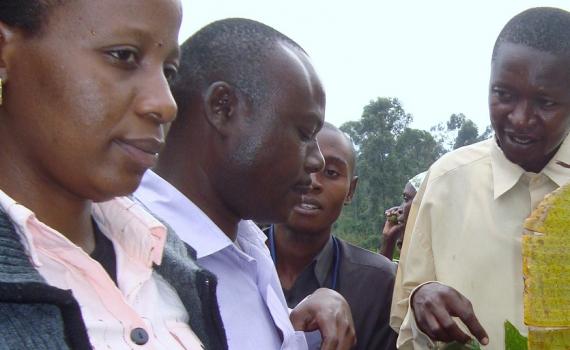
community need
Rwenzori Information Centres Network, popularly known as RIC-NET, works through a network of resource centres and community libraries, bringing information to 6,000 farmers in Uganda’s Rwenzori region. The farmers struggle to keep up yields because of severe infestations of plant pests and diseases, especially banana bacteria wilt, cassava wilt and maize weevil. In 2011, over 1,650 farmers approached RIC-NET urgently seeking treatment for infestations.
RIC-NET’s innovative project
With support from the EIFL Public Library Innovation Programme (EIFL-PLIP) in 2012, RIC-NET equipped 20 volunteers – six plant doctors and 14 community information facilitators – with smart phones. Working through a RIC-NET centre, Busongora Rural Information Centre (BRIC), RIC-NET trained the volunteers to use the phones to photograph diseased plants and to send the information to agricultural experts for identification. In addition, RIC-NET purchased two laptop computers and upgraded BRIC’s computers and internet connection, so that BRIC can provide free computer and internet access, and training for farmers and their families.
eifl-plip project timeline
May 2012 - April 2013.
achievements and Impact
In less than a year, the service helped over 850 farmers to find solutions to plant pests and diseases. The 20 volunteers are now permanently available to support farmers in Rwenzori Region. Numbers of people using BRIC more than tripled - from 310 in 2011/12 to 1,050 in 2012/13. Over 350 (about 48%) of the new library users are farmers.
additional resources
Read a two-page case study about the project.
More libraries improving farmers' lives
Read about more innovative public library services for farmers. PLIP-AGRICULTURE





